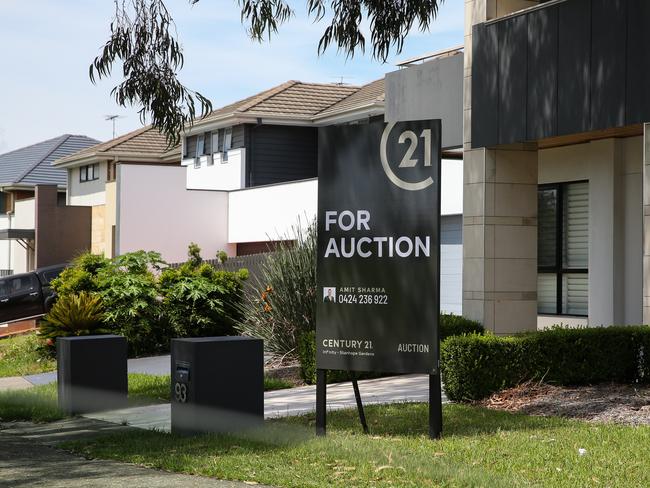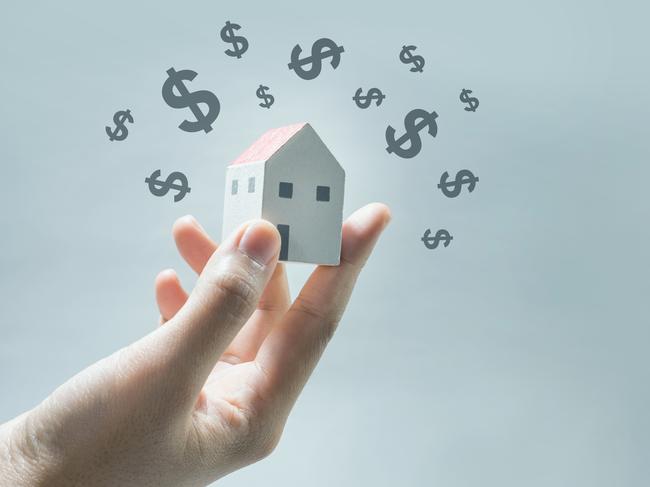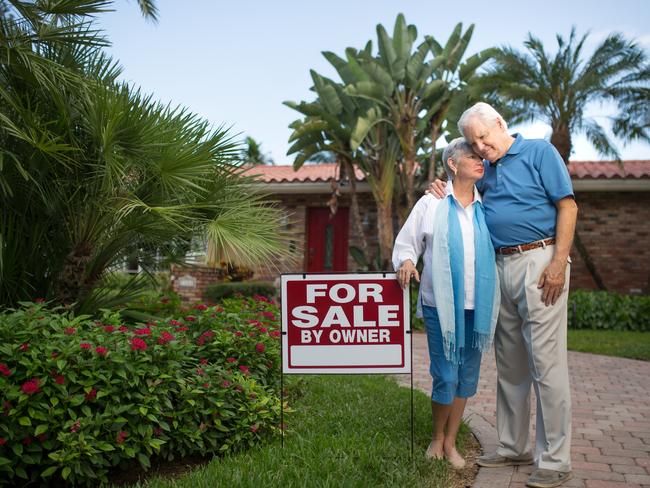Real Estate Australia: Why homeowners need a ‘Plan B’ right now
After almost a year of dramatic rate hikes, uncertainty over what happens next with mortgage repayments has never been greater. All homeowners need to make plans for the good and the bad.

Property
Don't miss out on the headlines from Property. Followed categories will be added to My News.
When it comes to the current real estate market, there are bargains to be had and you need to use your heart and the data, according to Selling Houses Australia host Andrew Winter.
Mr Winter and PropTrack senior economist Eleanor Creagh have revealed their insights into the property market and answered some of the burning questions from buyers and sellers regarding the best times to make a move.
They have also shared predictions regarding the next few weeks in terms of the economy and interest rate movements.
Mr Creagh said when it came to interest rates rises, we were “closer to the peak” with a decision due from the Reserve Bank of Australia board next week.

“We think they are probably going to lift interest rates another 25 basis points again,” she said.
“There are some people out in the market now calling for a pause.
“I do think a pause is on the horizon very very soon but I do think we will get that one final lift in April.”
She said the Reserve Bank had made a commitment to overcome the challenge of high inflation.
“We can’t think about when [interest rate] cuts are going to be on the horizon until we see inflation pressures a lot lower,” she said.
“Right now they’re significantly elevated and well above the Reserve Bank’s two to three per cent target band … unemployment would also have to be a lot higher as well.”

MORE
David Bowie’s ‘bizarre’ Sydney home sold for $8.8m
Sellers ‘in tears’ after surprise auction result
Landlord wants tenant to pay $325,000 for 6-month stay
Mr Winter said the property market was hanging in there due to interest rate “warning factor” which had given people time to rent out their spare room, get a third job and make extra payments to get ahead of their mortgage.
He said the thought of the Reserve Bank not increasing rates could be seen as a “little bit scary” in terms of the interest rate hikes stopping and starting again as opposed to gradual increases.
“Some economists say there’s logic to those great big jumps at the beginning because otherwise what you do is prolong the pain,” he said.

“If it goes on for years, everyone is in doom and gloom mode.
“I’m thinking forget booms, if you’re thinking about buying a property that is going to double in value in two or three years it isn’t going to happen.
“That only ever happens in every decade and a half. I think flatlining is probably the way the market will be for quite some time.”
WHAT DOES THE ‘BOUNCE’ IN HOME PRICES MEAN?
Ms Creagh said PropTrack saw a bounce in national home prices by 0.18 per cent in February with prices rising in every capital city aside from Hobart.
She said the supply of properties was reflected in home price dynamics, with the number of properties listed for sale on realestate.com.au lower than pre-pandemic averages.
“Yes there’s less home buying demand … but that’s being balanced or offset by the fact there are fewer properties listed for sale,” she said.

“We are seeing home prices have fallen for nine consecutive months last year but actually so far this year we have seen a bit of a bounce in home prices.”
Mr Winter said the data on home prices was further evidence the market was “flatlining”.
SHOULD PEOPLE TRUST THEIR GUT OR DATA?
Mr Winter said both data analysis and the good old “gut feeling” were equally important, however buying a property for a “home” was different to an investment.
The property guru said if you pay an extra $50,000 and live in the home for 10 years it “doesn’t actually matter”.
“Long term, the cost of chopping and changing because you made a mistake … just pay the price and enjoy,” he said.

“I’ve seen more owner occupiers make big sums of money on houses they live in then any money they have ever made on the investment property.
“If you can afford to do it take it … it’s all about emotion, it’s got to be.”
Mr Winter said people after an investment must rely on data and gut to make sure a home is right for renters.
However he said the “golden rule” in investing was if you pay $500,000 for a property the minimum real rent should be $500 a week “to avoid massive holding costs”.
“In some parts of Sydney it is absolutely impossible to do that,” he said.
The Bachelor mansion up for grabs for just $6.5k
$35m celebrity hideaway up for grabs
IS NOW A GOOD TIME TO BUY, SELL OR WAIT?
“If you are in a position to buy now, you buy now,” Mr Winter said.
“I’ve seen two many people hold off … that wait game is almost never worth doing.”
However he said it paid to have “Plan B” options if the market dropped such as renting out a spare room or taking or moving back in with mum and dad.
On the flip side, as a seller, you need to be committed to buy in that market.
“If the market tanks, it doesn’t matter as so did the value of your house,” Mr Winter said.
However, he said the move came with risks with merit in looking to buy once you had “literally exchanged and you are unconditional”.
For first home buyers, again it is a case of being “the right time”.
“If you think you can afford a home loan now with another little increase or two the good news is in another couple of years it’s probably going to go down,” Mr Winter said.
“If you can do it now, there’s no better time.”

WILL THE FIXED RATE CLIFF LEAD TO A CRASH?
There has been a lot of concern voiced around the “fixed rate cliff” when people on fixed interest rate home loans come to the end of their locked period.
Ms Creagh said the risks to the housing market had been “somewhat overstated”.
“We certainly know it will be the big test for housing market conditions over the coming months,” she said.
“Currently at the moment around 35 per cent of outstanding mortgage debt is fixed.
Around 70 per cent if that 35 per cent is due to roll onto an interest rate that will be substantially higher. So it will be a huge adjustment with respect to household budgets and cashflows that will need to be made by a large number of households.”
She said people need to make sure they are getting the most competitive deal from their bank, along with exploring other options to save.
Mr Winter said there were plenty of “buffers” in place and people are prepared.
“What the market needs not to happen is people get into mortgage stress and be forced to sell their home,” he said.
“People panic sell and things start to go down. That’s how a slump starts.”

ARE THERE DEALS OUT THERE?
“In every real estate office … at the back of the filing cabinet there will be a good deal,” Mr Winter said.
“Everywhere at any one time, even in the eastern suburbs … there is always something that is a good deal and it usually doesn’t start when it is first listed.”
His advice was when looking at real estate listings, always go for the oldest as they are usually the most “desperate”.
IS IT BETTER TO BUY A NEW OR RUN DOWN HOUSE?
Buyers often toss up options of a run down home compared to one that needs no work.
“It’s what’s right for you,” Mr Winter said.
He said he had never bought anything nice in his life, always going for the “daggiest, ugliest homes”.
“That’s what I love and I can’t see anything worse than paying top dollar for someone else’s kitchen and bathroom,” he said.
However he said the desire for turn key properties had become higher due to costs of renovations, unknowns of getting trades and time constraints.
Mr Winter described the new season of Selling Houses Australia as the “challenge season”.
“The market was a little bit of an unknown … it was certainly flatlining but what we didn’t expect was the lack of stock which is what has actually impacted the market,” he said.
“During that season we saw results that we weren’t expecting. It was a season of challenges and the unexpected.”
Selling Houses Australia, Wednesdays at 8.30pm on FOXTEL.





